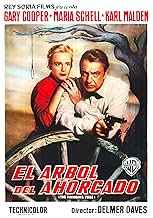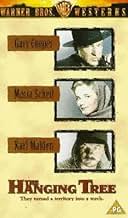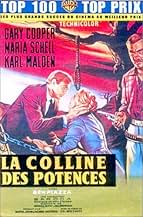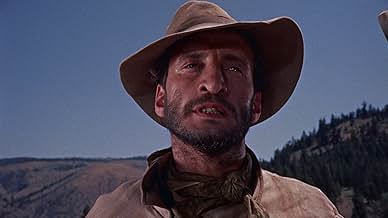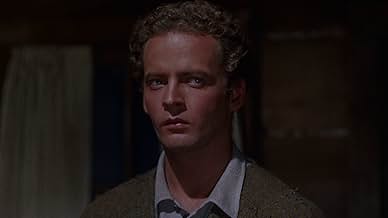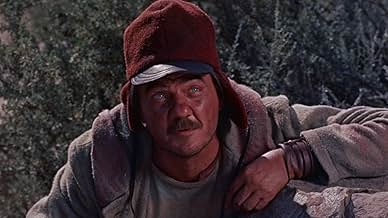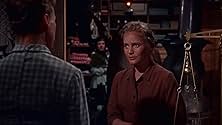IMDb RATING
7.1/10
5.2K
YOUR RATING
Unusual western about a doctor with a dark past, whose life is complicated and ultimately redeemed by a young thief, and a pretty Swiss immigrant whom he nurses back to health.Unusual western about a doctor with a dark past, whose life is complicated and ultimately redeemed by a young thief, and a pretty Swiss immigrant whom he nurses back to health.Unusual western about a doctor with a dark past, whose life is complicated and ultimately redeemed by a young thief, and a pretty Swiss immigrant whom he nurses back to health.
- Directors
- Writers
- Stars
- Nominated for 1 Oscar
- 1 win & 4 nominations total
Emile Avery
- Townsman
- (uncredited)
Fern Barry
- Mother
- (uncredited)
William 'Billy' Benedict
- Trapper
- (uncredited)
Oscar Blank
- Townsman
- (uncredited)
Danny Borzage
- Dan
- (uncredited)
Annette Claudier
- Dance Hall Girl
- (uncredited)
Tex Driscoll
- Townsman
- (uncredited)
Martin Eric
- Father
- (uncredited)
Frank Hagney
- Townsman
- (uncredited)
- Directors
- Writers
- All cast & crew
- Production, box office & more at IMDbPro
Featured reviews
This movie should be right up there with "High Noon", "The Searchers", "The Magnificent Seven", and other classic westerns. The cinematography and fantastic outdoor location alone make it a must see. Gary Cooper plays a gun-toting frontier doctor, with a mysterious past, Maria Schell, a determined immigrant, who becomes his patient. Karl Malden, a ruthless miner, who becomes her partner. The supporting cast is excellent, including a very slender young actor by the name of George C. Scott, whose performance is compelling. This is one of Cooper's last movies, and one of his best. I'm not really sure why, but this movie has not been enjoyed as much as it should, or received the praise it deserves. If you're a fan of the genre, and you have not seen this movie, you owe it to yourself to check it out.
Gary, for that movie, was Doc Joe Frail. Maria, sister of Maximilian Schell, became Elizabeth Malher. Everything that happened to Frail seemed real. He healed Elizabeth's blindness but feared loving her because of his past. There was the guilt from the tragedy he carried, the fear of someone finding out. The jealousy and anger of people waiting and wanting to take Doc's life for his past and, mostly, the fortune.
Frenchy Plante is played by Karl Malden. He is a fortune hunter with a drinking problem. Karl was one of two directors who made this film. Delmar Daves was in charge of the beginning and middle. Karl did the finishing work. By that time, Mulden had 20 movies under his belt.
George C. Scott is Dr. George Grubb, a Bible toting, Scripture spouting fiend. He is not a particularly nice person. He targets Doc Frail and goes after him. This is Scott's first credited role and he carries it off very well.
Jerry Livingston does the title theme. "The Hanging Tree". It was sung in the movie by one of my favorites, Marty Robbins. He, also, made it popular to the public through radio and records. Now I have a CD of "The Best of Marty Robbins" that I have introduced to my grandson. I want him (and our other grandkids) to know about something besides today's music.
Just for some aside information: The only cast member, of this movie, still living is Karl Malden. He turned 94 in March of 2006. Wow, what a life he's had!
Frenchy Plante is played by Karl Malden. He is a fortune hunter with a drinking problem. Karl was one of two directors who made this film. Delmar Daves was in charge of the beginning and middle. Karl did the finishing work. By that time, Mulden had 20 movies under his belt.
George C. Scott is Dr. George Grubb, a Bible toting, Scripture spouting fiend. He is not a particularly nice person. He targets Doc Frail and goes after him. This is Scott's first credited role and he carries it off very well.
Jerry Livingston does the title theme. "The Hanging Tree". It was sung in the movie by one of my favorites, Marty Robbins. He, also, made it popular to the public through radio and records. Now I have a CD of "The Best of Marty Robbins" that I have introduced to my grandson. I want him (and our other grandkids) to know about something besides today's music.
Just for some aside information: The only cast member, of this movie, still living is Karl Malden. He turned 94 in March of 2006. Wow, what a life he's had!
After an unfortunate family incident, embittered doctor Gary Cooper changes his name (to Joseph "Joe" Frail) and moves to 1873 Montana. "Doc" sets up shop in the aptly named Gold Rush town of "Skull Creek" with handsome young Ben Piazza (as Rune) as manservant, after saving the robber lad from death by posse. A stagecoach attack quickly provides Mr. Cooper with another housemate, Swiss emigrant Maria Schell (as Elizabeth Mahler). Baked and blinded by the sun, Ms. Schell heals into an uncommonly beautiful woman. As you might expect, patient and doctor are mutually attracted. Why she and Mr. Piazza amount to naught is not explained. Creepy head-capped Karl Malden (as Frenchy Plante) provides villainy...
"The Hanging Tree" looms forebodingly as we learn more about Cooper's contrary character; it's a good role for the aging superstar, in one of his best later years performances. We may be meant to consider the love of Schell providing Cooper with a possible second chance as the main story, but much more interesting is how the story deals with ownership. Cooper "owns" both Piazza and Schell in saving their lives, but is challenged for the latter by Mr. Malden. The proof that Cooper is a good soul is conveyed early, by his tossing of the bullet he took from Piazza and his gift to the malnourished girl. And, "The Lucky Lady Mine" owners believe the ownership of material wealth will bring happiness. Delmer Daves directs beautifully.
******** The Hanging Tree (2/11/59) Delmer Daves ~ Gary Cooper, Ben Piazza, Maria Schell, Karl Malden
"The Hanging Tree" looms forebodingly as we learn more about Cooper's contrary character; it's a good role for the aging superstar, in one of his best later years performances. We may be meant to consider the love of Schell providing Cooper with a possible second chance as the main story, but much more interesting is how the story deals with ownership. Cooper "owns" both Piazza and Schell in saving their lives, but is challenged for the latter by Mr. Malden. The proof that Cooper is a good soul is conveyed early, by his tossing of the bullet he took from Piazza and his gift to the malnourished girl. And, "The Lucky Lady Mine" owners believe the ownership of material wealth will bring happiness. Delmer Daves directs beautifully.
******** The Hanging Tree (2/11/59) Delmer Daves ~ Gary Cooper, Ben Piazza, Maria Schell, Karl Malden
Little known, this Western gem has not attracted the attention or appreciation it deserves. Gary Cooper's Doc Frail is to me the most interesting of his Western heroes, much more complex than the Will Kane of "High Noon." He is a man of sharp contrast, kind but domineering, compassionate but unyielding, a healer but a killer, strong but at the same time frail. He draws people towards him, only to keep them at a distance when they get too close because of a tragic incident in his past, one he can neither forget nor allow to ever happen again. He is a vagabond, moving from gold camp to gold camp to set up his services as a doctor, without hope of ever settling down. Into his life come two key figures bound to change it. One is Rune, a young thief whom he rescues from the hanging tree, and they are bonded together. The other is Elizabeth, a young woman from Switzerland who has come with her father to find a new life in the gold camps. After a stagecoach accident, Doc Frail must cure her, both body and spirit, and she loves him for it, a love he cannot accept. He would send her back to her country; she stubbornly refuses and eventually partners in a gold claim with Frenchy (played by the marvelous Karl Malden), a man with lust in his heart for both gold and women. The emphasis on character lifts this film above the realm of the ordinary. Add to that a memorable title song sung by Marty Robbins, an appealing music score by Max Steiner, a no-nonsense script based on a story by Dorothy Johnson and on location filming in the mountains outside of Yakima, Washington, and what you have is one really fine Western.
No need to recap the sprawling plot.
For a western, the movie is generously produced. The Washington state locations are scenic as heck and a great backdrop to the rushing crowds and boisterous miners. In fact, the gold camp recreation is one of the most realistic I've seen. Then too, the production has one of the most underrated directors of westerns of the period, Delmer Daves, whose list includes such classics as 3:10 to Yuma (1957), Jubal (1956),and the generally overlooked Cowboy (1958). All of these are tightly written and efficiently directed little gems.
But I have to say that despite the first-rate production values and a first-rate cast, this more epic sized western doesn't achieve the impact of Daves' smaller movies. The problem is a loose script and a dawdling camera that stretches out the dramatics and the movie's length to a sometimes tedious degree. I'm guessing that Warner Bros. wanted a production equal to Gary Cooper's iconic standing. I suspect they were also promoting newcomer Schell's career, and thus much time is split between her, Cooper, and the always reliable Malden. All perform well, but add up to bits and pieces that don't fit together very well, while padding the screen time unnecessarily.
I wish Scott's truly fearsome religious zealot had gotten a bigger role. He might have made the movie memorable, so strong is his spotty presence. Something I don't usually notice in films is the movie score. But here the music is blended nicely into the screenplay, without overdoing it. Perhaps revealingly, this is Daves' final western. From here, he went on to teenage fare, such as the blockbuster A Summer Place (1959) that despite its teen angst of the day is not without notable compensations. Anyway, this film's a scenic delight at the same time the narrative unfortunately is not, which adds up to a very mixed result.
For a western, the movie is generously produced. The Washington state locations are scenic as heck and a great backdrop to the rushing crowds and boisterous miners. In fact, the gold camp recreation is one of the most realistic I've seen. Then too, the production has one of the most underrated directors of westerns of the period, Delmer Daves, whose list includes such classics as 3:10 to Yuma (1957), Jubal (1956),and the generally overlooked Cowboy (1958). All of these are tightly written and efficiently directed little gems.
But I have to say that despite the first-rate production values and a first-rate cast, this more epic sized western doesn't achieve the impact of Daves' smaller movies. The problem is a loose script and a dawdling camera that stretches out the dramatics and the movie's length to a sometimes tedious degree. I'm guessing that Warner Bros. wanted a production equal to Gary Cooper's iconic standing. I suspect they were also promoting newcomer Schell's career, and thus much time is split between her, Cooper, and the always reliable Malden. All perform well, but add up to bits and pieces that don't fit together very well, while padding the screen time unnecessarily.
I wish Scott's truly fearsome religious zealot had gotten a bigger role. He might have made the movie memorable, so strong is his spotty presence. Something I don't usually notice in films is the movie score. But here the music is blended nicely into the screenplay, without overdoing it. Perhaps revealingly, this is Daves' final western. From here, he went on to teenage fare, such as the blockbuster A Summer Place (1959) that despite its teen angst of the day is not without notable compensations. Anyway, this film's a scenic delight at the same time the narrative unfortunately is not, which adds up to a very mixed result.
Did you know
- TriviaThe last western in which Gary Cooper starred.
- GoofsThis film seems to deflate the value of money disproportionate to its actual worth in the 1800s. The $1/egg that Rune pays the Flaunces is equivalent to over $23 each in 2024. A cattle baron at the Palace Hotel in San Francisco wouldn't have paid those prices. Frail and Flaunce deflate the value of Elizabeth's brooch as maybe worth $20, but in 1870 that was the equivalent of $470 (in 2024).
However, it is well known that prices in remote U.S. mining camps of the 19th and early-20th centuries were astronomical compared to the "civilized" cities. A cattle baron wouldn't pay that price in San Francisco, but he might in a "town" of a 100 people who had access to only a dozen eggs a week. A Smithsonian magazine article from 2015 states that "Back in 1849, a dozen eggs would cost the equivalent of $90."
- Quotes
Townsman in wagon: [Reassuringly to wife] Every new mining camp's got to have its hanging tree. Makes it feel respectable.
- ConnectionsEdited into Meine Schwester Maria (2002)
- How long is The Hanging Tree?Powered by Alexa
Details
- Release date
- Country of origin
- Language
- Also known as
- El árbol del ahorcado
- Filming locations
- Nile, Washington, USA(gold mining town set)
- Production companies
- See more company credits at IMDbPro
Box office
- Budget
- $1,350,000 (estimated)
- Gross worldwide
- $8,992
- Runtime
- 1h 47m(107 min)
- Aspect ratio
- 1.85 : 1
Contribute to this page
Suggest an edit or add missing content


